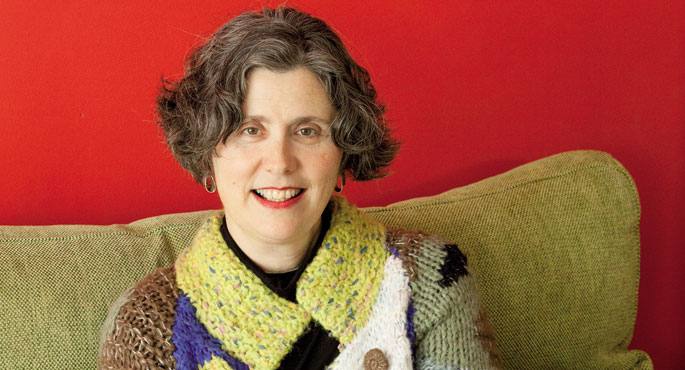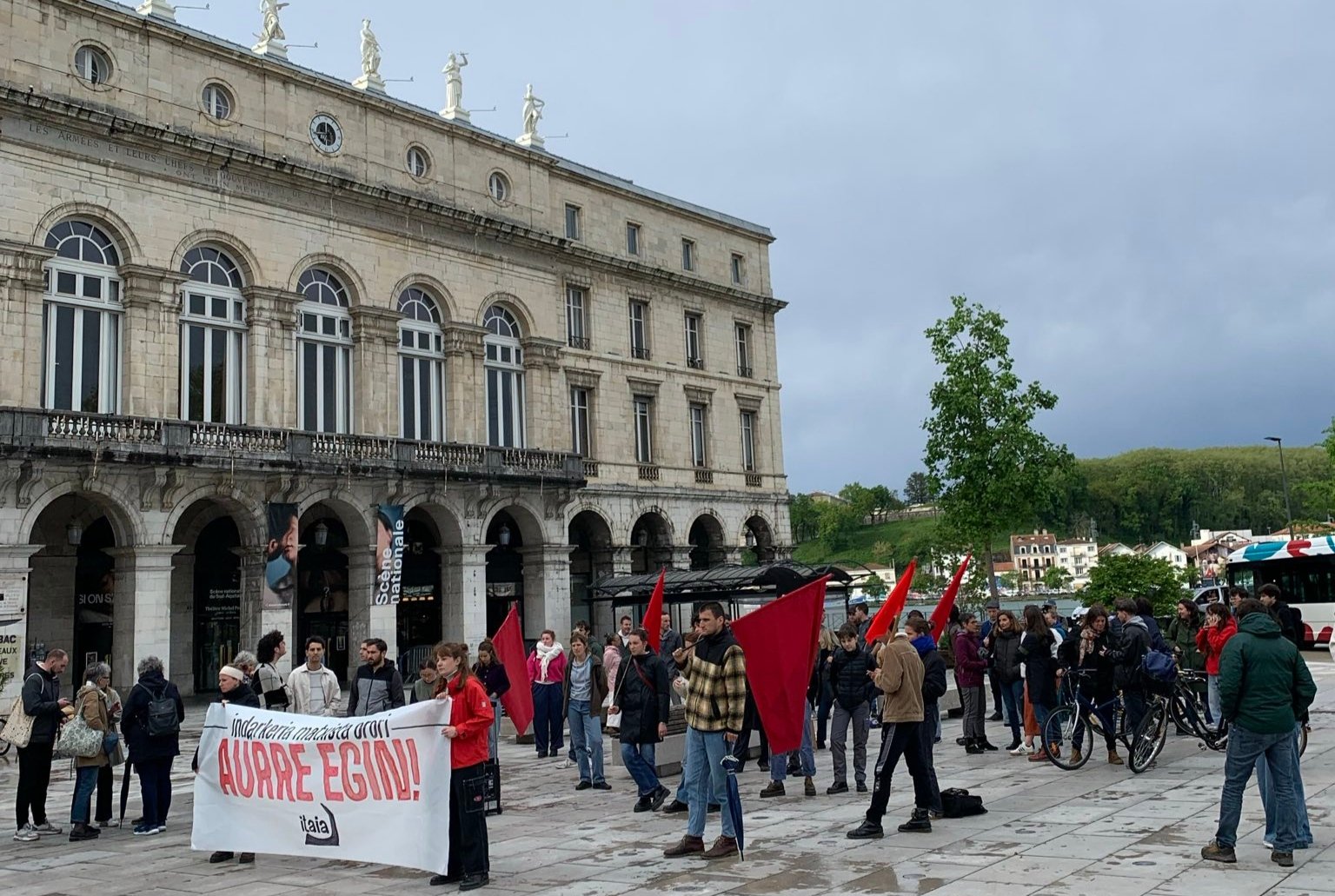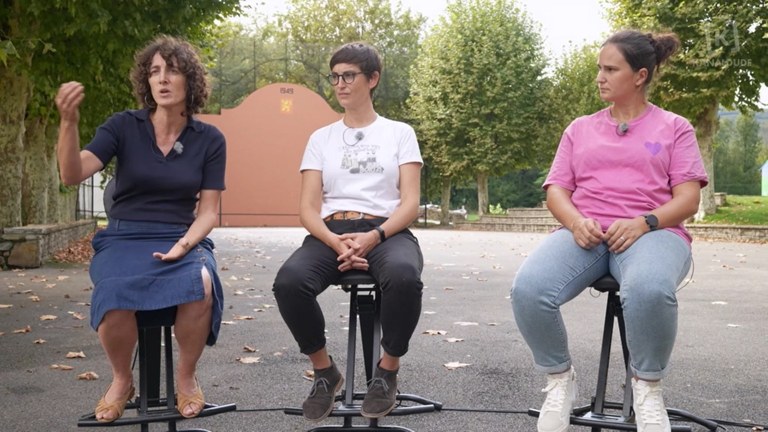"Feminism has demonstrated a great ability to adapt to new situations"
- Street feminism lived in Euskal Herria in the 1980s, along with other popular movements. The roar has been lowered on the street and, at present, the claim originates from various associations, institutions and universities.

I ran for news from you and headed for the following presentation: “Professor of the Anthropology Department at the UPV/EHU, has focused his career on feminism in particular.” A year ago, with these words they presented you in the Eralan Conference of the Cluster of Sociolinguistics.
Yes, I entered feminism in 1977, when the first days were held, in Leioa. I was a medical student. I finished my studies and entered the Family Planning Center in Basauri, created by the village women's association. From there, my professional and personal career, I've focused on feminism.
What is feminism, how is it defined?
You have a theory and a practice that you want to innovate in the world. I remember a feminist philosopher. According to him, it is enough that a group of women, whether men or not, who want to change their situation, make a coherent set of demands, both in theory and in practice, and organize themselves to do so, so that we have feminism. More simply, equal relations between men and women. Equal opportunities, if you like, or women anywhere.
“Women everywhere.” Nice motto.
In fact, women and men everywhere. On more than one occasion we have used this slogan, “Women everywhere”. Anyway, I also like “Women and Men everywhere.” Valid.
I thought men were everywhere: on the front page of newspapers and magazines, on the inside pages, on television screens, on government bodies…
Not everywhere. In surveillance tasks, for example, they are less. On the contrary, the presence of women in political parties has decreased. There's the collision. The photos are very good to notice this match. The other day I was looking at the Oscar nominees. About two hundred people were in the picture. Well, women were much less. Much less. I wasn't going to think right away!
Alarde. It is serious that this is still the case. This shame is repeated every year.
It is serious that we are still like this. When the incident occurred, we thought it would be fixed at once. But no. There are many factors at stake, for example politicians. You want to win the elections and others. The issue has become very complicated. The alarm can be used to represent the paradox that we have in the Basque Country. We are a progressive, egalitarian society, at least in general, and, on the other hand, we still have some knots, very difficult to release.
I just asked you about feminism. Are the feminism of the 1980s and the present manifested in the same way in the Basque Country?
No. Its nature – essence – has hardly changed. But the circumstances of society have changed, and feminism has also changed. I would say that in the mid-1990s feminism changed with society. At that time feminism was much more street, we were always on the street, there was always a manifestation around feminism, and in favor of many other things. So it was much easier to attract people, anyone could say they were a feminist. Now there's nothing like that. Feminism has entered more places, in institutions, universities, etc., but this has caused the visibility to be lost and with it the “illusion of equality”, as some say.
“The Illusion for Equality”?
Yes. Young people, for example, think it's a matter of previous generations, that they don't have problems of that kind. This makes alternatives and diagnosis difficult. Feminism has diversified a lot: we have professionals here and there. In the institutions they are working professionals, they can study in the universities… Diversification has meant the expansion of feminism, consolidation, and has generated an illusion, since objective data do not reflect the existence of equality.
Society has changed, the way we work for certain goals has changed.
As for feminism, and in general, it has changed the way we do politics. It's interesting. In Basauri, for example, we have Marienea, Casa de las Mujeres, where we have the section of Equality with various projects, Information Center, Office of Sexual Information, School of Empowerment, Meeting Center of Women’s Associations… The ways of making politics have changed. Feminist and other policy. We get to more places, but the reactions have also become obscured, they're adverse reactions. When the Spanish minister, Ruiz Gallardón, says “No to abortion,” the problem is easy to identify, but often it is not. Laws are for women, but how do they apply? Are there women's studies in college, but where are the means to start working? New problems have arisen that we did not foresee. And yet, I would say that feminism has shown a great ability to adapt to this new situation.
I've come up with some of the new issues that your last book brings. In this critique of loving thought, you're talking about loving thought.
We tend to use “romanticism” and it can be used. But when we use that word, most of the time we talk about how we make partners, how we relate to each other. Using the thought of love, I wanted to say that behind that way of creating a couple is an ideology. It is what opens up to the West: putting love at the center of human identity, considering heterosexuality as something central, the main way to organize the family and coexistence, the relationships between economy and emotions...
Is there any relationship between them?
This relationship is increasingly being analyzed and it is said that capitalism drives a concrete ideology of emotions, a concrete loving thought. Taking the scripts from the novels or pink films and the philosophy that drives capitalism, you see that both have a similar idea: that you can get everything through love, or will. In one case, the lover; in the other, success and money. But the script is similar. This economy needs a kind of loving thinking to advertise its ideology and keep women in place. Suppose the commercials on TV: the couple is in the middle, they need a romance. Romance, on the other hand, is completely commercialized, adventure, travel, dinner and the rest of the consumerist paraphernalia. Love is at the center of the subject, but also at the center of society. It is a concrete ideology.
Love in the middle. More than once I have heard that, that in the end there is nothing left but love.
We say love is the most important thing, but sometimes we don't know what we're talking about, or we don't realize it. We put justice, solidarity, freedom, friendship in the background ... All things have to be balanced. I would like to say: for women, freedom is very important, solidarity is also important. As important as love (sometimes). On the other hand, the pair – heterosexual – is at the highest point, as if there were no more love. We have to know that love relationships are very varied: within the couple, between friends, family relationships… You have to balance, they are all important, not one.
What is the formula for equating, balancing or reconciling all the loves?
It's not just a formula, it shouldn't exist. But don't think the model is one. We have created a main model and it is very difficult to live according to him: you have to live with your partner, you have relationships with her, you have to be in love with her, you have children with her… otherwise it is not worth it. The level of demand is very high and does not work. If we organized that current model differently, we would work better.
Do we have to create a new model?
Or recover and make visible other relationships that we have. From a certain age onwards, for example, you've already made a network of friends that help you when you get sick. In youth, on the other hand, it is common for students to share weight… We think they are second-level formulas, “until they find a partner”, we believe, but they are worthwhile formulas. We must also give visibility and courage to these roads, to which we really use them. On the contrary, we learn: nuclear family, father, mother and children. A model that is maintained through an ideology of concrete love, in the hope that it makes us happy. On the other hand, the ideology of happiness is very naive, because it is not possible to be happy at all times. In addition, the search for “happiness” maintains a determined social order.
Love thinking touches us in the same way as men and women. As for the mechanism, it is women who resort, not men.
When I make speeches, I often ask: “What is being a woman today?” And it's hard to answer that. But in response, we would say that it is the woman who has put love at the center of her identity, or rather, the one who has pushed herself. Women have to want others, take care of them, work for them… To begin with, although there are also cases backwards. It's very difficult to find a man who lives alone who is delivered to him. On the contrary, there are many women in it: “For me, the most important thing is love.” Although not in fact, yes in the speech. If that's your goal, you're at the mercy of others, you need the attention and affection of others to be content with yourself. And that dependence is very bad. For anyone, but in most cases it is women who live it.
Love, romanticism, difference. This is the title of a conference on the subject.
The ideology of love creates and maintains a certain world. A certain social order: you need family, private and public space, men in one and women in the other… An unpleasant world, not only for women, but also for men. In movies, for example, women are always poorer, darker… They succeed through love. That ideology says that the person below has love to be happy, the only chance to get something. That tells us, that we will achieve it through love. Just as in romantic novels, women will only succeed in being happy through a servant. Something very heterosexual, on the other hand. One will say: “Not everyone will listen to that.” Maybe not, but it's very hard to escape that when you're bombarded everywhere, songs, movies, advertising...
“Feminism, a reflection tool for the Basque Country?”, title of one of the conferences you did last year. What do feminism and Euskalgintza, or “Euskaragintza”, have to do?
I simply used the Basque language, making a little game. After all, all of us who are committed to Euskera, from education to feminism, do so. But we behave as if they were different areas. Two years ago I became an expert in Transmission of Basque Culture at HUHEZI. I wanted to make a monograph about Basque culture. I took the role of a student, which I normally don't take. When speakers talked about this or that, I always made comparisons with feminism, especially when talking about militancy and politics. I was constantly comparing (but not just me). Suddenly, through Nekane Goikoetxea, Iñaki Arruti told me if I would participate in the Udaltop Conference, if I would reflect, and I took it as a challenge, reflect, ask questions from feminism to the Euskera movement.
The path you have taken, in the background. Feminist, member of the Basque movement. You're Basque berri, from Basauri.
I am more Castilian than Euskaldun, if everything has to be said. I started studying in Basque in Basauri at the age of 14-15, when there was still no method of Euskaldunization. Today I teach in Basque, I speak in Basque with my son and with many friends, I do many talks in Basque, texts of anthropology… I make an important part of my life in Basque.
What was Basauri in Basque at one time, in his 14-15 years old, and what is it today?
It has changed radically. As a child, the woman who lived in front of our house, which we called the villager, has long died. He was Euskaldun, surely from Arratia. As part of an investigation, I interviewed a friend. He lived in Basozelai (Basauri district), where all were immigrants, and under his house, some were villagers, Basques. Later, when she saw people learning in Basque, the woman cried. The situation has changed a great deal. Here were eight or ten Basque families. Little by little, many people know how to speak in Basque in Basauri, I have many friends who speak in Basque normally.
Before and now, black and white.
Here is an association in favour of the Basque Country, Euskarabila, which after many years of work was in crisis. What was done last year? With the day of the Basque Country, a gigantic festival such as the one held in Lasarte-Oria: “12 hours in Basque”, under the slogan “Basauri be bagara”. It went very well, and now we're asking what we do. When I was a little one could not do “12 hours in Basque”. In addition, people from different generations have come together working in one way or another.
Would this conversation have been different from a woman's?
I don't think so. Why?
Mari Luz Esteban Galarza (Pedrosa de Valdeporres, Burgos, 1959), Basaurikoa da. Medikuntza ikasketak egin zituen EHUn (1983) eta Gizarte Antropologia doktoretza Bartzelonako Unibertsitatean (1993). Familia Plangintzako mediku izan zen lehenengo, eta antropologia irakasle gero. 1998tik hona EHUko Gizarte Antropologia arloko irakasle da, eta, besteak beste, Ikasketa Feministak eta Generoa masterreko koordinatzaile. Liburuak ditu Re-producción del cuerpo femenino. Discursos y prácticas acerca de la salud (2001), Antropología del cuerpo. Género, itinerarios corporales, identidad y cambio (2004), eta Crítica del pensamiento amoroso (2011), hainbat lanen artean.
Argiaren bilatzailean “emakume” idatzi eta lehen orrialdeko zenbait sarrera: “500.000 emakume hiltzen da munduan erditzerakoan. Minbizia detektatzeko programa emakume gehiagorentzat. Emakume gutxi eta gaizki irudikatuak zineman. Garraio publikoak emakume sentiarazi ninduenekoa…”.
Feminismo giroan hitz egin izan da horretaz, hitz egiten da, eta hitz egingo da, ziur aski. Biktimismoa azpimarratu dugu. Gizarte mugimenduetan, oro har, horrela jokatzen da. Euskararen aldeko mugimenduan, euskalgintzan, horixe egiten da. Egiten duguna baino, gaizki dagoena nabarmentzen dugu.
Many Basque feminists have been disappointed to learn that writer Chimamanda Ngozi Adichie has externalized pregnancy, meaning that a surrogate has fertilized her baby for money.Adichie is the author of the essay We should all be feminists, among others. They have ignored the... [+]
Indartsua, irribarretsua eta oso langilea. Helburu pila bat ditu esku artean, eta ideia bat okurritzen zaionean buru-belarri aritzen da horretan. Horiek dira Ainhoa Jungitu (Urduña, Bizkaia, 1998) deskribatzen duten zenbait ezaugarri. 2023an esklerosi anizkoitza... [+]
Gozamen aparta bezain deskribatzeko zaila dakar, norbaiten hitzak irakurri edo entzun ostean, zera pentsatzeak: “Horixe zen neu aurreko hartan azaltzen saiatu nintzena!”. Idazlea eta itzultzailea da María Reimóndez, eta galegoz aritzen da, hizkuntza... [+]
Orain arte desgaituak ez diren pertsonekin lehiatu da Uharteko Ipar Eski Taldeko Eneko Leyun eskiatzailea (Iruñea, 1998). 2024-2025 denboraldian, lehenengo aldiz parte hartu du Adimen Urritasuna duten Pertsonentzako Iraupeneko Eskiko Espainiako Txapelketan. Urrezko... [+]
Joan den urte hondarrean atera da L'affaire Ange Soleil, le dépeceur d'Aubervilliers (Ange Soleil afera, Aubervilliers-ko puskatzailea) eleberria, Christelle Lozère-k idatzia. Lozère da artearen historiako irakasle bakarra Antilletako... [+]
Endometriosiaren Nazioarteko Eguna izan zen, martxoak 14a. AINTZANE CUADRA MARIGORTAri (Amurrio, 1995) gaixotasun hori diagnostikatu zioten urtarrilean, lehen sintomak duela lau urte nabaritzen hasi zen arren. Gaitz horri ikusgarritasuna ematearen beharraz mintzatu da.
Duela aste batzuk, gurean egon ziren El Salvadorko eta Kanarietako emakumeen eskubideen aldeko hainbat aktibista. Sexu- eta ugalketa-eskubideez eta eskubide horiek urratzeak emakumeengan dituen ondorioez aritu gara; hala nola El Salvadorren berezko abortuak izanda homizidio... [+]
Zuberoako ohiturei buruzko bi liburu ditut gogoan. Batek XX. mendean aritu izan diren 180 dantzari eta soinulari aipatzen ditu. Haien artean, emakumezkorik ez da agertzen. Besteak, pastoralei egiten die errepasoa eta hor emakumeak aipatu aipatzen dira, baina omisio esanguratsuak... [+]
























